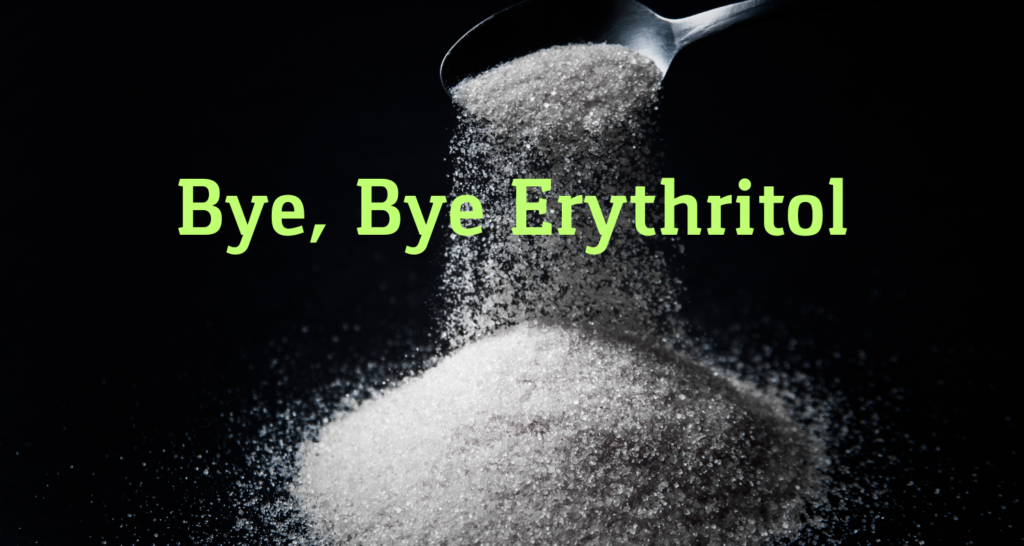
Have you been using products sweetened with erythritol? If so, you are not alone! Many of us have turned to this popular “natural” zero-calorie sweetener to help us cut back on sugar consumption. Erythritol is a sugar alcohol that can be found naturally in small amounts in many fruits and vegetables. However as man commonly thinks….if a little is good, then more is even better! So companies have been manufacturing erythritol by fermenting corn or wheat starch and adding it to processed food items in un-naturally high levels.
It has become a common ingredient in sugar-free chewing gum and candies, baked goods, protein bars, shakes, condiments, and sauces, and low-calorie, sugar-free beverages.
Here are some common food products that may contain erythritol:
Truvia: Truvia is a brand of sweetener that uses erythritol as the main ingredient. It is marketed as a natural, calorie-free sweetener.
Lakanto: Lakanto is a brand of sweetener that uses erythritol and monk fruit extract. It is marketed as a low-calorie, natural sweetener. (and use to be one of my favorite go-to sweeteners!)
Swerve: Swerve is a brand of sweetener that uses a blend of erythritol and oligosaccharides. It is marketed as a sugar replacement that has zero calories and does not cause digestive issues.
Quest Nutrition: Quest Nutrition is a brand of protein bars and snacks that uses erythritol as a sweetener in many of its products.
Halo Top: Halo Top is a brand of low-calorie ice cream that uses erythritol as a sweetener.
Lily’s Sweets: Lily’s Sweets is a brand of chocolate that uses erythritol and stevia as sweeteners. It is marketed as a low-sugar, low-calorie alternative to traditional chocolate.
SmartSweets: SmartSweets is a brand of gummy candies that uses erythritol and stevia as sweeteners. It is marketed as a low-sugar, low-calorie alternative to traditional gummies.
For years, erythritol has been generally considered safe and well-tolerated by most people. However, a study published just last month in Nature Medicine suggests that erythritol may increase the risk of cardiovascular disease. Researchers found that high levels of erythritol in the blood were associated with an increased risk of blood clotting, stroke, and heart attack, especially in people with pre-existing conditions such as diabetes.
Of course, more research needs to be done but in the meantime, it might make sense to me to limit erythritol in your diet for now!
There are several healthy sugar alternatives that you can use to sweeten your food and beverages without adding excessive amounts of sugar.
Some of my favorites:
- Stevia: A natural sweetener that comes from the leaves of the Stevia plant. It has zero calories and is much sweeter than sugar.
- Monk fruit sweetener: Made from the extract of monk fruit, this sweetener has zero calories and is also much sweeter than sugar.
- Raw honey: A natural sweetener that contains antioxidants and has antibacterial properties.
- Maple syrup: A natural sweetener that contains antioxidants and minerals such as zinc and manganese. It has fewer calories than sugar and a lower glycemic index.*
- Dates: A natural sweetener that can be used to sweeten baked goods. They are also a good source of fiber, potassium, iron, magnesium, and vitamin B6. They also have a low glycemic index.*
When using sugar alternatives, it’s important to remember that they should still be consumed in moderation as excessive consumption can lead to negative health effects.
*A low glycemic index, which means they release sugar slowly into the bloodstream, providing a steady source of energy without causing a rapid spike in blood sugar levels.






